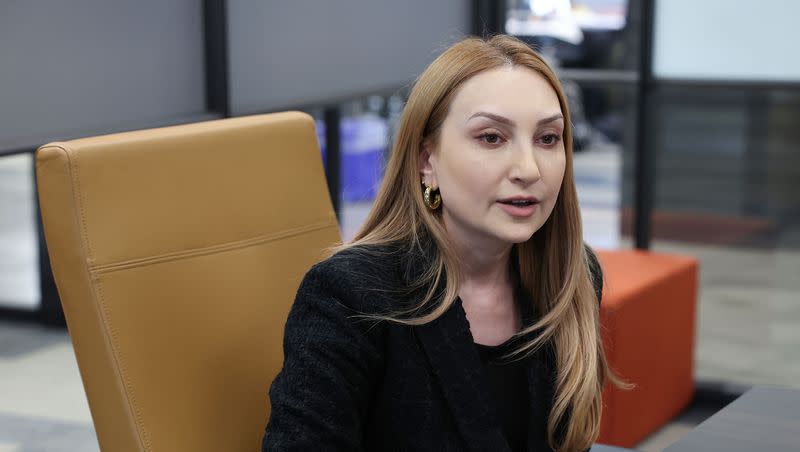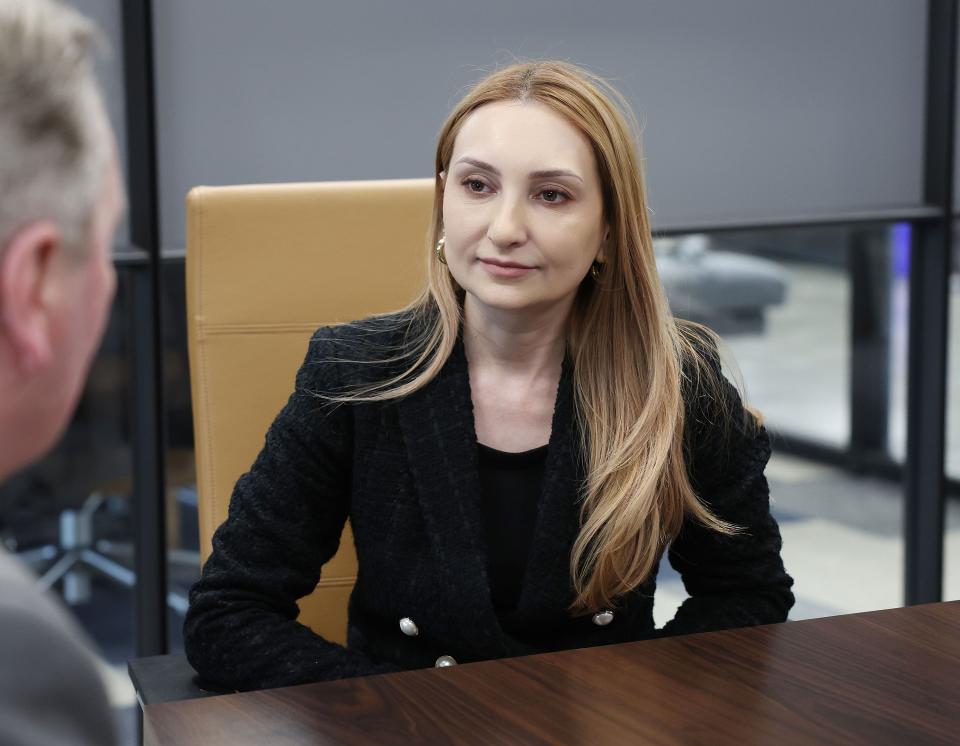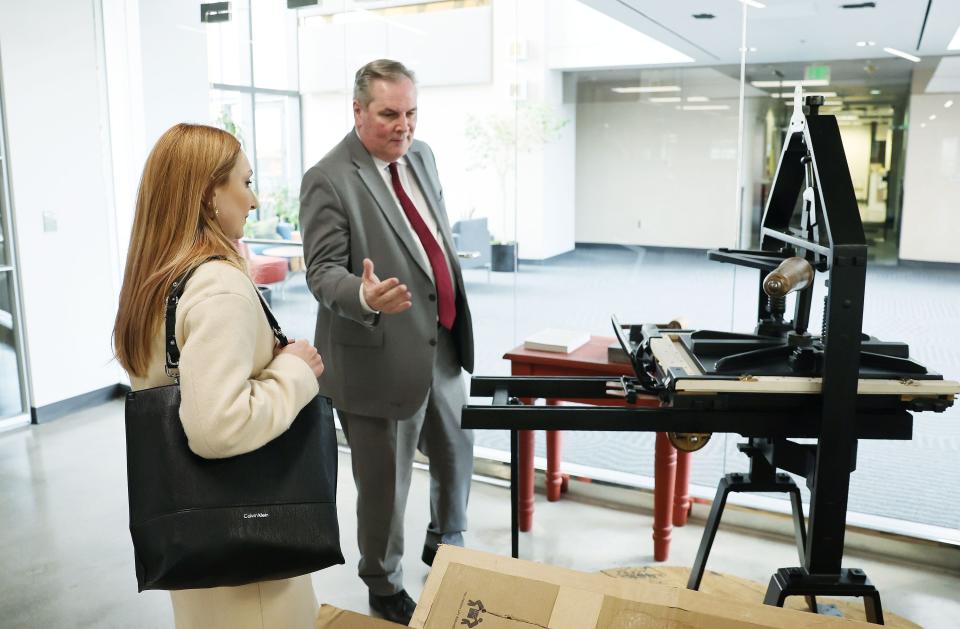Is there an opportunity for Utah in Armenia? A conversation with Ambassador Lilit Makunts

It might take a bit of time for a U.S. resident to find Armenia on a map. This landlocked country has Georgia to the north, Turkey to the west and Iran to the south. Its eastern border is with Azerbaijan, where border conflicts and battles over territory have marked both past and recent history.
The Nagorno-Karabakh conflict, named from the border region in dispute, has been sought by both Armenians and Azerbaijanis for decades, and most recently erupted in violence again in 2021. The search for peace, then, is top-of-mind for those from Armenia, including Lilit Makunts, the young Armenian ambassador who earlier this month landed in Utah at the invitation of World Trade Center Utah to build relationships and future opportunity between Utah and Armenia, a country of about 3 million people, similar to Utah’s size, if not geography.
Makunts, 39, was born in the Armenian capital of Yerevan and from a young age learned the value of family, faith and the necessity of peace and independence. In a conversation with the Deseret News, we explored the potential opportunities that exist for Utah and Armenia, and her own story as a former minister and now ambassador, based in Washington, D.C., until her term ends.
This interview was conducted in English and has been edited for length and clarity.

Deseret News: What were some of the things that you feel like you were able to accomplish while you were here in Utah?
Ambassador Makunts: Well, my hope is that first of all, we wanted Armenia to be more comprehensible — today’s Armenia — to be more understandable for Utah, and to try to explore each other since this is my first visit to Utah, to try to explore each other and what we can do together what we can do more, because there’s very little that we are doing together. And we can do more, be it education, science, economy, economic partnership, or trade partnership, or anything else. So the ties need to be strengthened. That’s my understanding. And despite the fact that we have very small diaspora here, I think, well, they can be helpful, too, in terms of, you know, crystallizing those ties.
DN: My understanding is that Armenia is a country of about 3 million people and you are trying to build your technology sector. Do you see any opportunity to tie with Utah’s technology industry?
AM: Absolutely. Well, the first thing when we were exploring Utah, the first thing that we heard is that, you know, is Utah is the tech hub. And given the the ambition of the Republic of Armenia to develop that sphere in our country, given the potential of the young people and the innovative potential. So we think we need to go somewhere with Utah with this, maybe starting with education, maybe starting with startups, but also going beyond that. So hopefully, by the time we plan the trip of the high tech minister to the United States, (we hope we will) also be able to bring the delegation to Utah and see what we can do together. ... That’s an idea. But we if we’re ever able to take take trade missions from Armenia to Utah, and vice versa, from Utah to Armenia, which does not necessarily mean that we can accomplish things instantly. But at least starting working in that direction would be helpful as well.
DN: Speaking here to an American audience, can you tell us more about what Armenia has to offer, what you bring to the world?
AM: So today’s Armenia, despite the challenges, brings a lot of hope and optimism. It’s because of the young people. It’s because of the commitment to develop the country as a democratic country. It’s because of our commitment and ambition to fight corruption. And it’s because of our ambition to be really sovereign and independent democratic state. So that’s one thing.
Another thing is, when I’m talking about really high degree of optimism, that first of all refers to the young generation that get a really qualified education. Most of them who decide to take education abroad, for example, their bachelor’s or master’s degree, they choose Western countries. And then they bring that potential back to the country. And that potential needs to be utilized.
Definitely the capacity that we have, in a semi-blockade situation, because our country is in a semi-blockade situation, we have close borders with two of our neighbors, it is very difficult to utilize that capacity. And this is where there is both an opportunity for the country to develop it, but also the opportunity for the partners, potential partners to develop stronger and mutually beneficial partnership. So that’s the first thing.
Armenian young people are very prone to technology, high tech field, they like working from their homes, they do work for a lot of companies in the United States living in the Republic of Armenia, so why not try to do that, you know, to use that in a in a different way, and to create opportunities for them and for the country. Also, you know, education is another field that we are very much focused on. The vast majority of the Armenian population has higher education. And by seeing higher education, I mean, at least a bachelor’s degree. Young women are very much into education and into the banking and business sphere as well. So there is another potential there to explore.
And again, innovation is something that we can focus on. Last May, we launched the first satellite ever of the Republic of Armenia, which is a basic satellite. But I think ... we should move in that direction, and we need education and basic skills, as well. So that’s another thing that we can do with Utah.
DN: You mentioned young people several times. You yourself are quite young, and I’m sure have become a face of Armenia for the younger generations. What are some of the things they talk to you about? Are there obstacles that they’re having to overcome? Whether it be for education or for employment? What do you see that you need to accomplish to help that younger generation?
AM: Well, I come from the parliament to the United States. So in my previous job (as majority leader from 2019 to 2021), it was my responsibility and obligation to talk more to the people to the voters to the citizens of the republic.
I was back then trying to explore what are the hardships of the people, what kind of conditions we should create for the young people to stay in the country and not emigrate. And one of the things is how (to engage) education and work together. So how to help them to get education, but not deprive them of work at the same time, because most of the work they would be doing requires a full-time job. So they have to start as well. And the education system of the Republic of Armenia is a little bit different, that doesn’t allow them to be engaged in full-time working.
So that’s that’s one of the things and we made certain legislative amendments and adopted trusts that would allow them to get, for example, a master’s degree and in certain directions in certain fields, and at the same time work and pay their income tax. So the legislative bill was about the following: We adopted a bill which said those students who, for example, studying high tech — certain subjects — they can pay for their education from their income tax, and that helped them a lot. And we also boosted certain fields and certain spheres that we think that have great potential or are underrated, underestimated.
Another thing was how to support the young families and support the demography of the country, so that they work, they have families, and nothing is done at the expense of the other. So we introduced other bills and other decisions by the government, helping financially with every birth of the kid. That was one time that is one time payment. At the same time, help with the health insurance of all the kids in the country all the time. Young people in the countries starting from the birth till age 18, health insurance, but also covering them and giving them a monthly stipend up to age 8.
So those are the things that we’re trying to do. But most of them are social packages, let’s say this way, so that we help them not to think in that direction. So to help them with their professional growth.
DN: Ambassador, you’ve been involved as a youth and very young age in your country. Where did you get your interest in politics and in helping your country?
AM: So when Armenia proclaimed its independence, almost every family, every person in the Republic of Armenia was engaged in the independence movement. And my family too. And my father, too. I was very young, I was a kid, I didn’t understand much of what was happening. But I saw how excited my family was. And I saw my father with a blanket going to the Freedom Square to the Republic Square, and supporting the independence movement. And we got that independence. So if I dig deeper, where it started from it probably started back then.
And then later, when I was a student at the university, I participated in my first ever youth movement, social movement, which was called in the benefit of science and education. And that movement succeeded. And that movement won the cause that it was preaching for. It was back then that I figured out that, you know, by exercising your rights, and doing it in a peaceful way, it is possible to achieve success. And that’s what democracy is. So it was back then the interests that I got engaged in politics, and at the same time doing academia and doing my Ph.D. (in cognitive linguistics).
So starting in 2003, I was participating in basically all social and political movements. And that’s where I know the current administration, and then the government was a team back then. So in 2018, the Velvet Revolution happened, a nonviolent revolution, the permanent government was formed, the cabinet, it was for six months. And the prime minister offered me to join the cabinet and become the minister of culture for six months. That was back then.
One of his major goals was to eliminate and eradicate corruption in the country, which was, in my opinion, the basic reason for the nonviolent revolution. And that’s why he brought in people who were, who had zero experience in the corruption. ... But that also meant that we had no experience in the state government. So it was a growth process at the same time growing process.
And at the end of 2018, we had snap elections. We got the 72% of votes. And I became the majority leader back then. By the way, the it was the biggest majority in the history of the Republic of Armenia. And then after the war, the government and the prime minister decided that we need to have a political appointee in Washington, D.C. And when we had another snap election, because you want to make sure that the people want the current government to continue the job. And when he got reelected, and the majority party got reelected. Then I came here.
DN: And you’ve been an ambassador two years?
AM: Almost two years.
DN: Our audiences are a pretty faithful audience, a Christian audience, among others. Can you tell me a little about Armenia’s faith community. Just learning about its commitment to Christianity, the past apostolic origins, can you talk to me about the faith of the people, and, if you’re comfortable, even your own upbringing in that faith, and what we might learn working together with that perhaps as a foundation?
AM: Sure, with pleasure. Well, we are known to be the first nation that adopted Christianity officially. And we’re very proud of that fact. We’re a conservative society. ... It’s interesting how it’s possible to be conservative and progressive at the same time. But this is what you can see in today’s Armenia, and how welcoming and diverse the Armenian society at the moment is. ... We cherish our values that we have, we cherish the family values. Family is the most important thing for us.
If it weren’t for it, for our commitment to the family, dedication to the family, we wouldn’t probably be able to survive the way we did. Definitely the church played a big role in this. And that’s one of the things I want to underscore here. Because the times when we didn’t have independence, the times when we, when we were under attack, our identity was preserved because of those, and due to those dedicated people and clergyman in the church that preserved our alphabet, preserved our literature that preserved our faith and identity and culture and traditions. So that’s where the history comes from. And we are, we’re very grateful for that.
The Constitution separates the church from the state. So they do not rule the country together. It’s only the government that rules the country. But we have deep respect for the institution of church for the reasons that I just mentioned. And even today in the diaspora, I mean, back in the Republic of Armenia, it’s a little bit different in terms of the role, it’s more about the faith. It’s more about the values. And it’s more about disseminating those values. However, here in the diaspora, the church still takes the role of keeping the identity of reminding people, reminding the Armenians who we are, where we come from, and what our main goal is, what the main mission is.
DN: How would you describe those values?
AM: Well, those values are about tolerance, are about patience, are about humility, are about service, and are about resilience. But resilience not in a negative sense, but in the most positive sense, the kindness. You know, a couple of minutes ago, we were talking about peace. I don’t want to talk to about naming conflict, I want to talk about peace.
After the war in 2020, both Azerbaijan had POWs in the Republic of Armenia, and we still have POWs in Azerbaijan, and back then we had even more POWs. So what we said publicly — the government and we as people — we said, you know, humanitarian issues are out of negotiations, humanitarian issues should not be treated, those issues need to be resolved. And as an example of that, we said if we are talking about that, if we think that’s the right thing to do, we are going to do that first. And unconditionally, because that’s that’s a matter of dignity for us. And as a matter of dignity of those people who are under hostage, including from Azerbaijan in Armenia.
We released all the POWs, all of them from all of the years, including the 2020 war, and we resolved all the humanitarian issues regarding the maps and mind maps that would save lives of the future soldiers serving from Azerbaijan. That’s what our values are. And, unfortunately, we didn’t get all of the POWs back and we still have 33 POWs confirmed also by Azerbaijan. But but that’s how I’m depicting what we believe in. And we think that we need to show our own example. What humility is, what kindness is, or tolerance is, what patience is with faithfulness and loyalty. And we’re a very loyal nation.

DN: Do you have a personal faith that you draw upon as you go about your work?
AM: Well, I am Christian. And I’m a follower of Armenian Apostolic Church. And I talk about that with deep pride and respect. And the values that I spoke about, you know, life is so that sometimes you can get distracted. But it’s important to constantly remind yourself that, you know, those are the values that you need to pursue every day, including during your work, including during the times when you just can’t help being that, but you but you have to pursue those values. And those are the times that the church helps. And those are the times that you know, getting together and sharing with each other, reminding each other about them about the values that are important for all of us helps to be focused and not get distracted.

